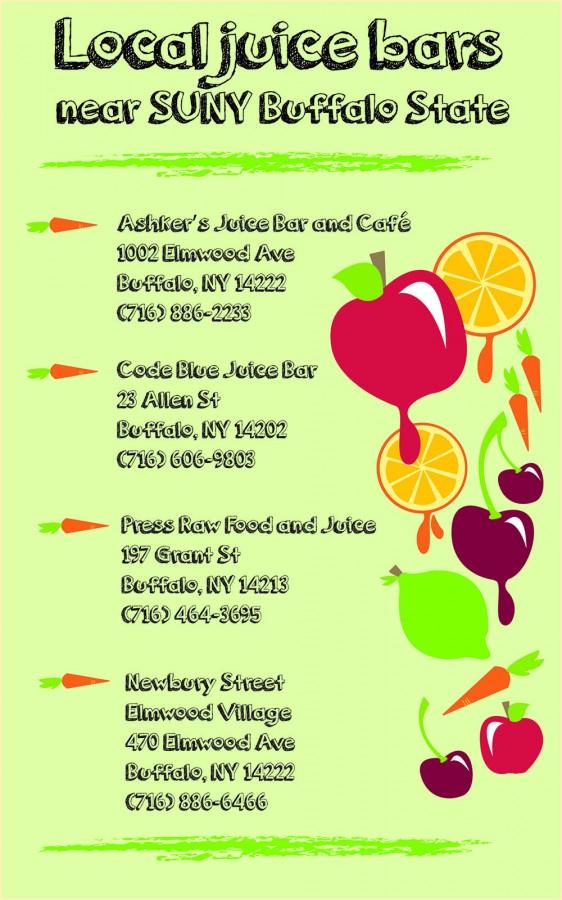The truth about juicing
October 15, 2014
The latest health trend has hit Western New York: juicing. There are juice bars popping up locally when a few years ago there were none in sight.
What is juicing?
Instead of the popular blend of fruits and vegetables for smoothies, juicing is a little bit different. With the help of tabletop juicers, instead of blenders, the fiber is removed from the ingredients used. The fiber being removed makes it possible to eat more servings of vegetables than you would be able to put in a smoothie.
A recent Dallas Daily News article, “A juicy idea for good health?” by Jamie Hancock reported, “Dallas-based nutritionist Lauren Talbot says a juice is simply water, natural sugars and enzymes from fruits and vegetables.”
What are the benefits and drawbacks?
If someone finds that they are not eating as many fruits and vegetables as they should, juicing may be an option. It also adds vegetable diversity to an everyday diet. There is room to experiment with ingredients that aren’t a favorite if eaten raw. For example, the mix of fruit with vegetables helps mask the taste of very pungent green flavors.
“Juicing proponents believe that your digestive system can function more efficiently when drinking raw vegetables. Although you lose the benefits of consuming fiber when drinking your produce, it takes less energy to digest food in liquid form,” said Lisa Ko, author of PBS article: “5 things you need to know about juicing” published in 2011. “Heating and cooking vegetables also reduces or destroys some of their enzyme content, which some say can impede digestion. With juicing, it’s believed that these food enzymes are not only preserved, but your digestive system also gets a ‘rest,’” she said.
It is said that drinking raw juices uses less digestive energy. This is why people are claiming to feel more energetic after juicing. “You feel lighter, more energetic,” said Mitch Berstein, certified wellness coach at Elixir Juice Bar in Dallas, in the recent Dallas Daily News article. “If you do it longer, the eyes have more of a sparkle and the skin tightens, as soon as you lighten the load on digestion issues. It’s almost an anti-aging aspect.”
The major problem that arises with juicing is the lack of fiber. Fiber is known to be an important part of a balanced diet and nutritionists say reduces the risk of diabetes as well as heart disease. Fruits and vegetables are a common source of dietary fiber. Fiber also makes that “full feeling” last longer, which helps you eat less and lose weight more easily. This is why it is important to not rule out whole vegetables and fruits completely and why finding another source of fiber should be a concern for someone who juices.
“If it’s going to help you consume more fruits and vegetables in a day then it’s a good thing. I personally promote, don’t drink your calories. I tend to believe that eating the whole fruit or vegetable is much healthier,” said Assistant Professor of Dietetics and Nutrition at Buffalo State College, Carol DeNysschen, who has a doctorate in nutrition and exercise science.
What about cleanses and detoxing?
Cleanses and detoxing are the diet fad that have been tagged on with juicing. But are they healthy? What are the risks? There is much debate on whether or not these new dietary practices have positive outcomes.
Local juice bar Squeeze, located in Williamsville, sells three levels of cleanse packages ranging from $47 to $140. “I found out you could do the one day cleanse we offer once a week and it would be OK for your body,” said Lynnette Lingenfelter, one of the general managers at Squeeze. The “three day intro” allows raw food to be a part of the process of drinking four juices a day. It is gentler on your system and recommended for someone who is new to juicing, while the “three day detox” includes 18 juices, six per day, is better for those who are more experienced with juicing.
“I don’t typically recommend cleanses,” said Squeeze employee Alyssa Herman. “Usually people come in and want to do the cleanse, [specifically] the three-day detox. We ask if they’ve done cleanses before and try to start them on either the one-day reboot or the three-day intro. You can have a very adverse reaction if you go straight into it.” At Squeeze, they give customers a guideline packet when they buy a cleanse package that gives them an idea of what they can expect during the process.
“I really have a problem with these cleanses,” DeNysschen added. “Your body has a million bacteria; 80 percent of those are beneficial. Once you start doing those cleanses [laxatives] it’s actually disrupting the balance of good and bad bacteria. You feel great for a day but it doesn’t last. And they do not ‘detox’ you. There is no definition of detox. It is a marketing term that seems to work.” DeNysschen said
The point of cleanses and detoxing is said to give your digestive system a break. For weight loss purposes, it will really only shed off water weight. “I think the cleanses are a diet fad. What happens when the three days is up? All you’ll want to do is stuff your face. Drinking just juice for three or five days is torture,” said Sarah Frank, pilates instructor at Stretch Pilates, after hearing her friend’s experience with a cleanse. “Once the cleanse is over, it is likely that water weight will come back,” Frank said.
In a report on fitsugar.com called, “Are Juice Cleanses Healthy,” the risks of cleanses outlined include dehydration, nausea and fatigue. Harley Pasternak, celebrity trainer, said in the article cleanses are “the worst thing ever” and that juices are not as beneficial as smoothies. “There is no protein in juice. There is no fiber in juice. There are no healthy fats in juice. The amount of produce that you would need to create a sizable beverage or juice is a calorie bomb and full of sugar.” Instead, Harley recommends smoothies over juice “in order to get those important nutrients from the seeds and skin of your produce,” said Pasternak.
Adding juicing to your lifestyle
Research and consulting health professionals before making any dietary changes can help.
By starting out with local juice bars, this option offers a way to see if this is worth an investment in an expensive juicer. Juicing is a health-kick that is all about individual moderation. Local juice bars Ashker’s, Code Blu, and Newbury Street have food as well.
There is no magic juice that will help you lose weight overnight, but if it can be a start to a healthier lifestyle, maybe it’s time to jump on the bandwagon.
Email: [email protected]














